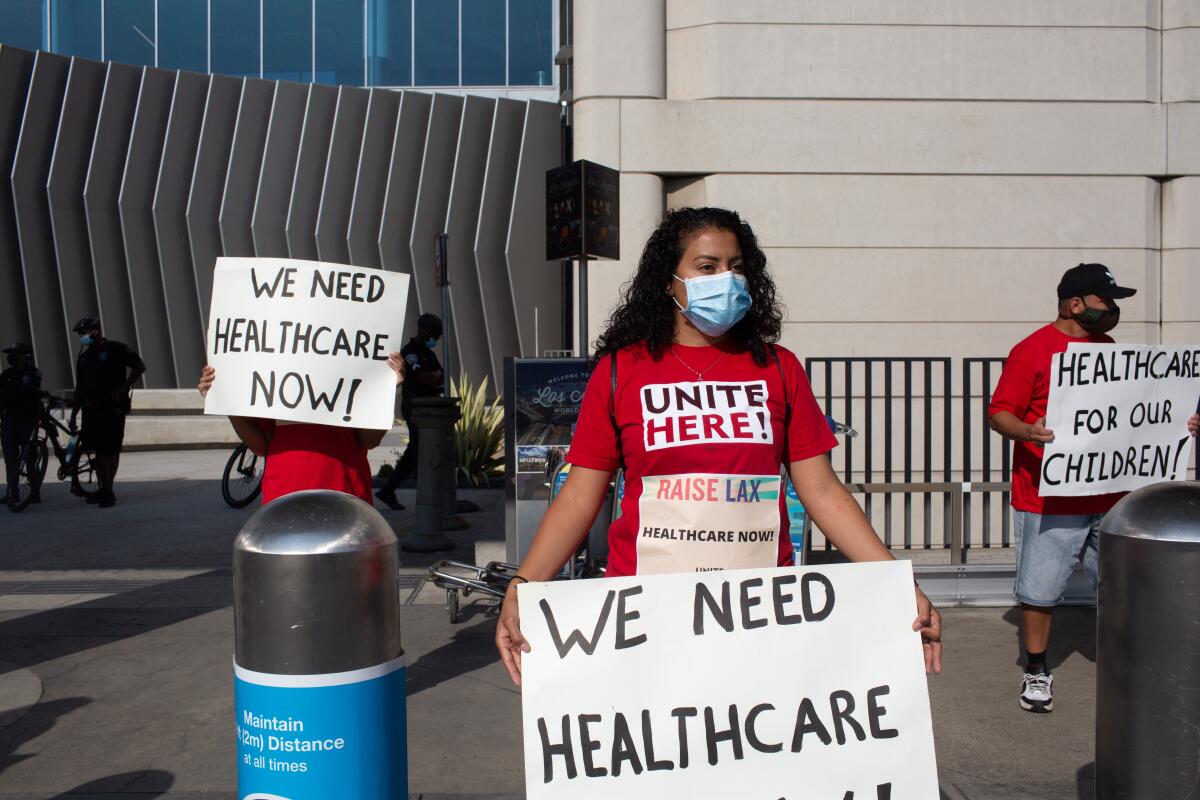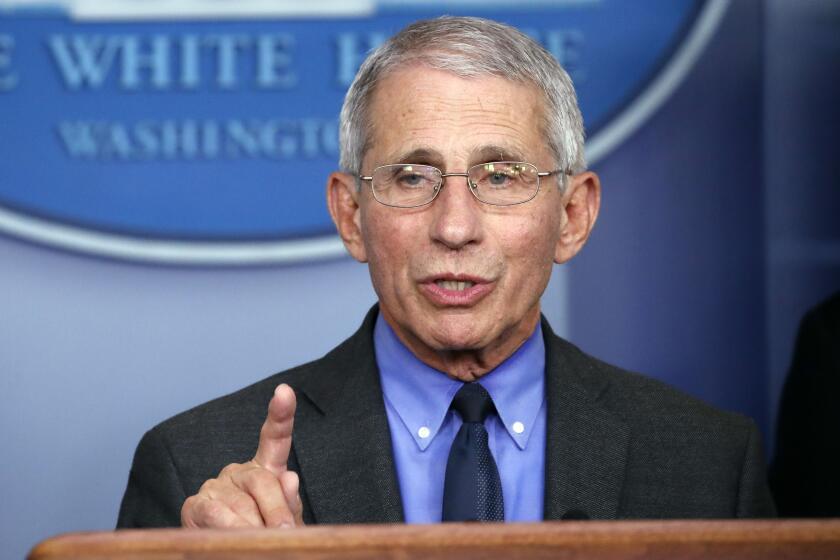Op-Ed: How COVID-19 caused the U.S. to implement universal healthcare

- Share via
In the early stages of the COVID-19 pandemic, the federal government made a stunning declaration: Healthcare is a right, not just a privilege — a right that would be immediately funded and backed with more than $100 billion.
As one of the most unassuming side effects of the coronavirus, America, for the first time in its history, implemented a system of universal healthcare.
Here’s how it happened.
In mid-March, the Families First Coronavirus Response Act was enacted in the face of looming economic turmoil — it required sick leave be paid by certain employers, expanded eligibility for unemployment benefits and established the standard of free coronavirus testing. This was quickly broadened by the Paycheck Protection Program and Health Care Enhancement Act, to a total of $2 billion in reimbursement to providers to cover testing for the uninsured. Around the same time, the CARES Act was passed, which allocated as much as $100 billion more to the healthcare industry to treat uninsured COVID-19 patients.
Initial fear and uncertainty of the virus’ toll established the political climate to pass this disease-specific universal coverage, without debate on whether healthcare was a privilege or a right. With this series of rapidly signed bills, policymakers answered that question — and with resounding consensus.
Remarkably, six months into universal “COVIDcare,” there have been no constitutional challenges, no “death panels” and no political theater or doomsaying about it.
The provisions of these COVID-19-response bills will expire when the public health emergency ends. While the panic surrounding the coronavirus has decreased, the social and economic impacts of it are just beginning to be realized.
Another emergency is brewing.
Hospital charges are still being tallied, cases continue to climb, and the country’s cumulative COVID-19 bill is already crippling. Insurers will likely offset these towering costs by drastically raising premiums, possibly beyond the threshold of affordability for most Americans. Unemployment continues to rise as funds from the Paycheck Protection Program — a federal loan program designed to help small businesses keep workers on the payroll — run out and furloughs become permanent layoffs.
Dr. Anthony Fauci warns the U.S. could be in for a hard winter if coronavirus infections don’t come down, during a talk at the Berkeley Forum.
With insurance largely tied to employment, the number of uninsured Americans is poised to skyrocket. As our country’s health insurance model becomes increasingly unstable, so does the insurability of our population. Nearly 8 million Americans have already contracted the virus infection. Some will undergo months of rehabilitation from lasting or permanent conditions related to their illnesses such as stroke, cardiac disease and chronic lung disorders. Many survivors may require lifelong treatment that includes prescription drugs, regular clinic visits, and even nursing home or home healthcare.
The financial cost associated with COVID-19 healthcare doesn’t begin to encompass the indirect costs from loss of productivity — the inability to work, strain on family and caretakers, and all-consuming worry and anxiety. Even COVID-19 patients who never required hospitalization are displaying “long hauler” effects, which include chronic symptoms like shortness of breath, fatigue, brain fog, body aches and chest pains.
Since America has gotten sicker, the insured risk pool in its current form will become unpalatably expensive to cover. Both the medical community and policy experts have expressed significant concern that COVID-19 infection could quickly become a preexisting condition — one that insurers might mitigate with exorbitant premiums or a refusal to insure at all.
This is the future of American healthcare in the COVID-19 era: more and more uninsured patients, interminable medical bills and deteriorating chronic health conditions. The financial, medical and socioeconomic effects of COVID-19 are only going to continue to worsen the overall health of the country — and the burden of an increasingly sick and uninsured population threatens to send shock waves through the foundation of this nation’s healthcare.
The pandemic-response bills codified the notion that all Americans are entitled to a minimum level of healthcare. That basic care was initially defined as virus testing and treatment, but as the effects of the virus propagate, that definition will inevitably need to be revised. Even President Trump, after treatment with the experimental antibody cocktail developed by Regeneron, announced to the American people, “I want to get for you what I got, and I’m going to make it free.”
American healthcare must be revamped into a comprehensive system of universal coverage that meets the needs of our nation, beyond just a single disease.
Health is truly the great equalizer: Regardless of race, age, gender or class, every one of us gets sick. Nearly every developed nation has implemented some form of universal healthcare, including the United Kingdom, Canada, Switzerland and New Zealand. Yet our healthcare system consistently ranks worse in quality and higher in expenditure than any of our foreign counterparts. Now that we have dipped a tepid toe into the shallows of universal healthcare, we should heavily invest in creating a sustainable permanent model of affordable healthcare for all.
De facto universal healthcare was our only viable option at the height of uncertainty. The system was as crude as it was rapid, and confusion riddled its early implementation.
Fragmented campaigns for universal healthcare have dotted the past century of American history, from the Progressive Era to Obamacare. Rather than wait for another surge of the coronavirus or some other critical tipping point to clumsily nudge us toward this inevitable outcome, we should use COVIDcare as a building block to craft a new vision of healthcare for America
Dr. Amy Faith Ho is an emergency physician in Dallas who frequently writes and speaks about healthcare.
More to Read
A cure for the common opinion
Get thought-provoking perspectives with our weekly newsletter.
You may occasionally receive promotional content from the Los Angeles Times.











